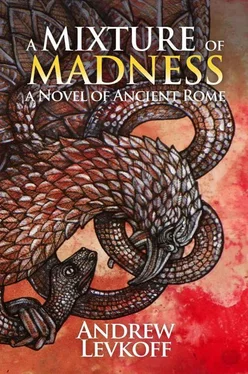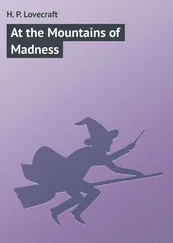Andrew Levkoff - A Mixture of Madness
Здесь есть возможность читать онлайн «Andrew Levkoff - A Mixture of Madness» весь текст электронной книги совершенно бесплатно (целиком полную версию без сокращений). В некоторых случаях можно слушать аудио, скачать через торрент в формате fb2 и присутствует краткое содержание. Жанр: Исторические приключения, на английском языке. Описание произведения, (предисловие) а так же отзывы посетителей доступны на портале библиотеки ЛибКат.
- Название:A Mixture of Madness
- Автор:
- Жанр:
- Год:неизвестен
- ISBN:нет данных
- Рейтинг книги:5 / 5. Голосов: 1
-
Избранное:Добавить в избранное
- Отзывы:
-
Ваша оценка:
- 100
- 1
- 2
- 3
- 4
- 5
A Mixture of Madness: краткое содержание, описание и аннотация
Предлагаем к чтению аннотацию, описание, краткое содержание или предисловие (зависит от того, что написал сам автор книги «A Mixture of Madness»). Если вы не нашли необходимую информацию о книге — напишите в комментариях, мы постараемся отыскать её.
A Mixture of Madness — читать онлайн бесплатно полную книгу (весь текст) целиком
Ниже представлен текст книги, разбитый по страницам. Система сохранения места последней прочитанной страницы, позволяет с удобством читать онлайн бесплатно книгу «A Mixture of Madness», без необходимости каждый раз заново искать на чём Вы остановились. Поставьте закладку, и сможете в любой момент перейти на страницу, на которой закончили чтение.
Интервал:
Закладка:
In Junius, having been at home less than two months, we fled the city, a month earlier than most, taking refuge in our Baiaen villa to escape not only the heat, but the extravagant parties that preceded the aristocracy’s departure just after the elections were announced in Quintilis. So it was that my lord made himself unavailable to stand for consul as he had agreed with Caesar. Pompeius, too, was absent, having sailed for Sardinia, Sicily and Africa to negotiate the purchase of desperately needed grain to feed the 300,000 mouths of Romans citizens who depended on the state to sustain them.
We tarried in Baiae and did not return to the city until October. Livia stayed behind, asking and receiving permission from Crassus to remain in Rome over the summer. The city suffered its worst bouts of illness in the heat and humidity of the season; my brave healer would do what she could in our master’s clinic, opening its doors to all, with his blessing. Crassus left both guards and provisions to feed and heal the sick, and though his name was imprinted on every sack of grain and every ampulla of medicine, I cannot believe his sole motive was selfish.
Fate had just returned Livia to me and now, laughing, was dragging me away from her again. Oh, it must have been great fun for the immortals to play this foolish game of hide and seek, concealing Livia from me, then allowing me to find her, then pulling her away again. Thus it had been ever since we had met, she as a child, me newborn to the house of Crassus. I pined for her when we were apart, and wept when we were reunited. Since that first kiss under the statue of Apollo in the garden of Crassus, a memory twenty years old yet fresh as a new-picked flower, I was no longer master of the heart that beat inside my own breast, but slave to a desire postponed and never satisfied.
Oh, for the love of reason! Surely you who read these scrolls must agree this kind of hand-wringing whining is utter drivel. Can love and wisdom coexist? Do not think it for an instant. It is widely known that Aristotle defined love as “the composition of a single soul inhabiting two bodies.” First of all, he was talking about friendship, and second, I have it on good authority that at the time he uttered those words, he was falling down drunk.
One has to be at least as ancient as I am now to see that if you try to make sense of life, if you look for patterns and meaning, not only are you bound to be disappointed, you are likely to waste a good deal of precious time.
As we neared the city late in the day, the tombs of the wealthy sprang up like mushrooms on either side of the Via Appia, each vying for prominence, crowding up against each other until the left side of the road succumbed to the shadows of these tall and lavish castles of the dead. A bulwark of beggars, arms waving like undersea flora in the tide of our passing, hugged the curb on the opposite side, still awash in the warming sun. Only those few creatures too sluggish of thought or foot were left almost unseen in the gloom.
Riding at my place just behind dominus , I was applying needless energy with helpless gusto worrying over something over which I had no control. As you may imagine, this was a pastime I visited with zealous frequency. Presently, I was ticking off the preparations Curio would have had to oversee and complete within the hour to adequately, which is to say, perfectly prepare for our homecoming. Had the furniture been cleaned? Had the masks of the ancestors been dusted? Was the house warm enough? What about supper? Had the gardens been pruned? Were there fresh flowers in every room? Had the house gods received their offerings? The list went on and on until even I began to tire of my finikin disquiet. Why should I fret? Lucius was a younger version of myself; left to maintain our Roman residence while we sought the cooler breezes of Baiae, I knew I would find everything in pristine order. Which is precisely when a more insidious thought crept in to harass my better self. Wouldn’t I love to find just one small thing with which to find fault: a lamp wick untrimmed, a corner not swept, a pillow not plumped, something to chide the ever-flawless Lucius Calpurnius Curio? Of course I wouldn’t.
I diverted my mind’s energies to screwing tight the taps on my mind’s caustic, leaky faucet and concentrated instead on nothing at all. I had only a moment’s rest from myself when, from her raeda , lady Tertulla leaned out a window and called the procession to a halt. Being closest to her carriage, I leapt off Apollo, my dark brown bay, and inquired how I might assist her. “Follow me,” she said, opening the door and stepping down onto the road. Immediately surrounded by a troop of guards, she brushed them aside and headed for the shadowed curb. Only Crassus seemed unperturbed. He did not know what she was up to, but was not about to come between her will and her objective. His six senate-appointed lictors crowded about him, their eyes busy.
Tertulla approached a boy who looked no more than twelve (I later learned his small frame had suffered in this world for fifteen years). He was wrapped in rags, sitting on the curb with an empty begging bowl between his legs. His hair looked as if it had never been cut, or washed. Something about his eyes was off and unsettling-they were too far apart and their focus lagged behind whatever drew their attention. In addition, his head struck me as too large for his frail shoulders. These defects, however, faded to insignificance in the light of the boy’s startling, beatific expression. He was looking up at us with the most innocent, guileless smile I had ever seen upon man or woman. He positively beamed, as if he had been sitting there waiting for this precise moment his entire life. The effect was multiplied by his outstretched arms: they did not seem so much a supplication for alms as an urgent wish to be picked up and held.
Then I saw his hands.
What I beheld was the result of no accident. Someone had deliberately cut off the majority of the poor child’s fingers, leaving him with only the thumb and third finger of each hand. An involuntary shiver ran through me as I imagined the transformation in his trusting aspect when that mutilation was perpetrated. It had to have been deliberate-what kind of accident could leave such a perfect array of carnage?
Domina snapped me out of my morbid speculation. “That smile-I saw it from the carriage. I had to stop to behold this wonder.”
From deeper within the shadows behind the boy, one of the guards dragged an older man. He was dressed no better than the lad, but unlike the boy, his grey, whiskered face was made of a clay that had long ago set into a resentful scowl.
“Put your arms down, fool,” he growled at the child. The boy winced at the man’s voice, slowly lowering his arms in unison without unlocking his elbows, as if he were setting down an invisible basket.
“Can you speak?” domina asked. “What is your name, child?”
“Hanno!” the boy shouted proudly, his head shaking for emphasis, his arms springing up again into the air.
“ Domina ,” I whispered in her ear, “the boy is what we in Greece call an ‘idiot.’ He is malformed in both mind and body. Let me put a coin in his bowl so that we may depart.” I dropped an as , then another into the wooden bowl and was taken aback by the boy’s reaction. His attention, which had been riveted to the kind smile on my lady’s face, whipped from her visage to mine; his jaw dropped, his eyes widened, and he yelped with what I was to learn was his unflappable state of ear-splitting enthusiasm. His squeal of gratitude, and now his outstretched arms were directly squarely at me. That others were witnessing a communication between myself and this unfortunate…well, I was discomfited. I thought to reply with a curt word of comfort or a nod of my head, but I could only stand with my hands at my sides, pinned by his idiot grin.
Читать дальшеИнтервал:
Закладка:
Похожие книги на «A Mixture of Madness»
Представляем Вашему вниманию похожие книги на «A Mixture of Madness» списком для выбора. Мы отобрали схожую по названию и смыслу литературу в надежде предоставить читателям больше вариантов отыскать новые, интересные, ещё непрочитанные произведения.
Обсуждение, отзывы о книге «A Mixture of Madness» и просто собственные мнения читателей. Оставьте ваши комментарии, напишите, что Вы думаете о произведении, его смысле или главных героях. Укажите что конкретно понравилось, а что нет, и почему Вы так считаете.












